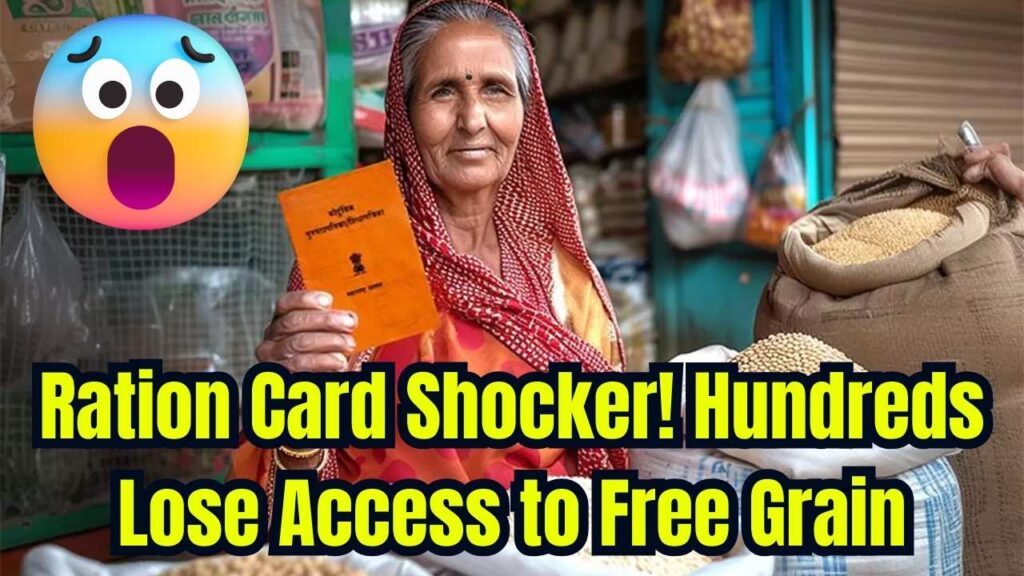
In recent news, many families in India have been hit with a shocker: “Bad News for Ration Card Holders! Hundreds of Families’ Cards Cancelled – No More Free Wheat and Rice.” This issue has especially impacted the state of Uttar Pradesh, where the government has taken stringent action to eliminate ineligible or duplicate ration cards from the system. If you or someone you know depends on subsidized food grains, understanding this development is crucial.
Why Were Ration Cards Cancelled?
The government of Uttar Pradesh has undertaken a rigorous verification process to ensure only eligible citizens receive subsidized food items like wheat and rice under the National Food Security Act (NFSA). As a result, over 1.42 crore ration cards have been cancelled since 2017 [Sabrang India]. This effort, aimed at improving the efficiency of the Public Distribution System (PDS), is a major step toward curbing corruption and ensuring fair access.
Bad News for Ration Card Holders
| Topic | Details |
|---|---|
| Total Ration Cards Cancelled | 1.42 crore (Uttar Pradesh since 2017) |
| Main Reason | Verification of ineligible or duplicate ration cards |
| Governing Act | National Food Security Act (NFSA) |
| Target Beneficiaries | Priority Households and Antyodaya Anna Yojana (AAY) families |
| Food Items Affected | Wheat, Rice, Sugar, Kerosene |
| Official Website | NFSA Official Portal |
The cancellation of ration cards has left hundreds of families without access to basic food supplies. While the initiative aims to clean the system of corruption and inefficiencies, it’s important that genuine beneficiaries are not wrongfully excluded. If your card has been cancelled, don’t delay in taking action. Check your status, gather your documents, and reapply or file a grievance.
Understanding the Ration Card System in India
Before diving into the cancellations, it’s important to understand how ration cards work. In India, ration cards are a lifeline for millions, providing access to food grains at subsidized prices.
Types of Ration Cards
- Antyodaya Anna Yojana (AAY): For the poorest of the poor; entitled to 35 kg of food grains monthly.
- Priority Household (PHH): Identified by states; entitled to 5 kg per person per month.
Under the NFSA, around 81.35 crore people are entitled to receive food grains at highly subsidized rates.
Why This Matters: Impact on the Poor and Vulnerable
Imagine a family that relies entirely on subsidized food from the government. A cancellation means no access to cheap rice or wheat, making it extremely difficult for low-income households to survive.
Common Reasons for Cancellation
- Duplicate ration cards
- Migration or death of family members
- False income declarations
- Failure to link with Aadhaar
Even though the intention is to clean up the system, the process can sometimes mistakenly affect genuine beneficiaries, which raises serious concerns.
What You Can Do If Your Ration Card Is Cancelled
Don’t panic. Here’s a step-by-step guide you can follow:
Step 1: Verify the Cancellation
Go to your state’s Food and Civil Supplies Department website or visit the local ration dealer to confirm your card’s status.
Step 2: Check for Errors
If you believe your card was cancelled in error:
- Collect all necessary documents (Aadhaar, income proof, residence proof)
- Get an affidavit confirming your eligibility
Step 3: File a Complaint or Reapply
You can reapply through the official NFSA portal or visit the Tehsil or Block Development Office (BDO). Alternatively, use the NFSA Grievance Redressal System.
Step 4: Track Application Status
Once re-applied, keep tracking the application status online or via SMS notifications.
What the Government Says
According to official sources, the eligibility norms for ration cards remain unchanged since October 7, 2014. The government has clarified there are no new directives mandating mass cancellation or surrender of ration cards.
However, the Uttar Pradesh Assembly Speaker had previously instructed officials to identify and remove ineligible persons to improve transparency.
Marriage Certificate Registration: Step-by-Step Process, Documents & Fees
Practical Advice: How to Ensure Your Card Is Safe
- Link Aadhaar: Ensure every family member’s Aadhaar is linked to the ration card.
- Update Information: Report any changes in family status, income, or address immediately.
- Keep Documents Ready: Maintain digital and hard copies of your ration card and supporting documents.
FAQs: Ration Card Cancellation in India
Q1: How do I know if my ration card is still active? You can check the status on your state’s Food and Civil Supplies website or the NFSA portal.
Q2: Can I appeal if my ration card is cancelled? Yes, you can file a grievance or reapply with the correct documents.
Q3: Is Aadhaar mandatory for ration cards? While not mandatory, linking Aadhaar helps prevent cancellation due to identity mismatch.
Q4: What are the consequences of having a cancelled ration card? You will no longer be able to receive subsidized food grains until your card is reinstated.
Q5: How long does it take to get a new ration card? It usually takes 15 to 30 days, depending on state procedures.







